The Way It Is by Donalda Reid
 Summary: Ellen’s father’s mid-life crisis when his best friend dies unexpectedly feels like the end of the world for Ellen herself. Suddenly she’s starting over in a new high school in a small town called Salmon Arm, British Columbia, and because it’s 1968 she is facing serious discrimination about her academic and career ambitions to become a doctor. Feeling like an outsider, meeting Tony, another outsider, on the bus to school is just what Ellen needs. Tony is an Indian who is marginalized like Ellen is, albeit in different ways and for different reasons. Their growing friendship and attraction challenges both of them and those around them, but also gives them the strength to follow their dreams.
Summary: Ellen’s father’s mid-life crisis when his best friend dies unexpectedly feels like the end of the world for Ellen herself. Suddenly she’s starting over in a new high school in a small town called Salmon Arm, British Columbia, and because it’s 1968 she is facing serious discrimination about her academic and career ambitions to become a doctor. Feeling like an outsider, meeting Tony, another outsider, on the bus to school is just what Ellen needs. Tony is an Indian who is marginalized like Ellen is, albeit in different ways and for different reasons. Their growing friendship and attraction challenges both of them and those around them, but also gives them the strength to follow their dreams.
Number of Pages: 282
Age Range: 14-16
Review: Part historical fiction and part romance, The Way It Is by Donalda Reid ends up being a smart and inspiring read. Although I’m labelling it as romance I don’t mean it in a derogatory way, because Reid’s development of Ellen and Tony’s relationship is authentic and not overdrawn. Instead it’s a partnership, two people supporting each other against the attitudes of the time they live in.
The backdrop of 1968 is captivating as Reid informs her reader of what life was like as a woman and as an Indian during that time. There are some books that should be read because they provide valuable insight into our past, and this is one of them. There are complicated issues of hierarchy and power, self-esteem in relation to societal attitudes, and also the exploration of embracing being an introvert when others expect extroversion.
Reid has some beautiful moments of prose and I simply grew to love Ellen, her protagonist. Also, I enjoyed how Ellen’s parents were committed to helping others and managed to do so in a way that was as unobtrusive as possible.
What I think I like the most though is that the ending is open. This is not a story about two people falling in love and then only focussing on staying together. It’s about the best of friends who fall for each other, but who are both dedicated to achieving their dreams. Perhaps they’ll keep in touch as they attend schools in different parts of the country and eventually end up together, but maybe they will cherish the time they had t and use it as a learning experience to inform future relationships. It could go either way. But either way they are both people with a capacity to grow and to love that will serve them well wherever they end up.
Memorable Quotes:
“I’m not alone, Ellen had thought in amazement. There’s another person like me, even if she is only a character in a book.” – Ellen from The Way It Is by Donalda Reid, page 3
“After Ellen had weathered countless rebuffs and teasing, she had stopped trying. She had stayed an outsider. She convinced herself that she preferred to be alone, that she didn’t need friends. She spent her time in solitary activities. Reading and learning, her constant companions, never disappointed her. When being alone was her choice, it no longer hurt.” – Ellen from The Way It Is by Donalda Reid, page 21
“The lake was mirror calm, stretching like cerulean satin out to the reflected mountains on the far shore. Sparks of sunlight flashed from the ripples the geese made as they broke the flat surface of the water. The beauty of the lake and the quiet of nature’s solitude washed over Ellen. For a moment she felt that if the geese took flight, she could lift her arms and fly with them.” – Ellen from The Way It Is by Donalda Reid, page 136
The Way It Is by Donalda Reid is published by Second Story Press, (2010).
Out by Sandra Diersch
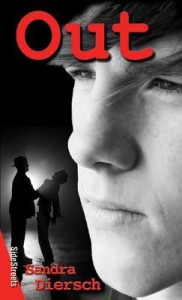 Summary: When Alex sees his friend’s father kissing a woman who isn’t his wife, his already fragile hold on faith in God is shaken as the man is a prominent member of the Catholic church Alex attends. As Alex struggles with his faith, he also finds himself dealing with a brother who is struggling to claim his sexual identity, and a girlfriend who is exploring her own beliefs. Challenged by various situations to re-evaluate his convictions, Alex is faced with deciding what is truly important, and the need to examine how far he is willing to go to meet God in the middle.
Summary: When Alex sees his friend’s father kissing a woman who isn’t his wife, his already fragile hold on faith in God is shaken as the man is a prominent member of the Catholic church Alex attends. As Alex struggles with his faith, he also finds himself dealing with a brother who is struggling to claim his sexual identity, and a girlfriend who is exploring her own beliefs. Challenged by various situations to re-evaluate his convictions, Alex is faced with deciding what is truly important, and the need to examine how far he is willing to go to meet God in the middle.
Number of Pages: 131
Age Range: 15-17
Review: Out by Sandra Diersch is aptly titled but not for entirely the reason you might think. Yes, Alex’s brother does come out as gay and a large portion of the book is about others’ negative and homophobic attitudes toward this. But it’s also about Alex outing himself as a doubter.
Raised in a religious family with a devout Catholic father and a mother who converted, Alex is trying to come to terms with the fact that he doesn’t feel God anymore. It’s something that has been brewing inside him for a while it seems, but seeing a man he believes is a good Christian committing adulterous acts seems to be his breaking point. If such a man can pretend to be pious and betray his wife in secret, then what hope does anyone have to truly believe and follow God?
What I love about Alex’s story though is how his brother clues him in to the true nature of faith. His brother, who prays fervently to God to change his situation, understands that faith is not a one way street, it involves give and take from both parties. It’s more than just a feeling. Alex’s mother also reiterates that doubt is normal, and even if Alex’s dad doesn’t doubt at all, it doesn’t mean Alex is wrong to harbour his own doubts.
It’s a brief but thought-provoking story, skimming the surface as an introductory novel to deeper questions of faith and acceptance.
Memorable Quotes:
“‘It must be great to go through life never having a doubt, or a question about God or faith, eh?’ Riley said, drumming his fingers on the door.” – Riley from Out by Sandra Diersch, page 34
“‘Don’t ask, don’t tell – is that what you’re saying, Fletcher?’ Garrett said at last. ‘Sorry, I’m not going to hide who I am just to make everyone else feel better. If I want to hold my boyfriend’s hand walking down the street, then why shouldn’t I? Why is it so different when I do it?'” – Garrett from Out by Sandra Diersch, page 92
“Now Alex knew that even if you don’t play with fire you can get burned, that sometimes being yourself leaves you open to hatred, and that faith is a very fragile thing.” – Alex from Out by Sandra Diersch, page 131
Out by Sandra Diersch is published by James Lormier & Company Ltd Publishers, (2009).
B for Buster by Iain Lawrence
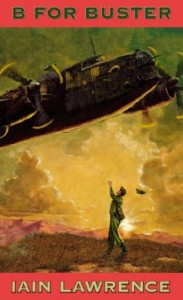 Summary: Enlisting early in the air force at the age of sixteen to escape an abusive situation at home, Kak is in England and in over his head. As the wireless operator in a bomber plane during World War II, he is so traumatised by his first couple of times on the job bombing targets in Germany that he wants to quit. Quitting isn’t an option though and while everyone must complete a minimum of thirty missions, it is rare for bombers to live that long. Kak’s watching his friends die left and right as planes don’t come back from their missions, and his only solace is found in caring for the pigeons that accompany them on their missions. Befriended by Bert, the pigeons’ caretaker, Kak finds his way through this terrible time in his life as best he can with the support of others.
Summary: Enlisting early in the air force at the age of sixteen to escape an abusive situation at home, Kak is in England and in over his head. As the wireless operator in a bomber plane during World War II, he is so traumatised by his first couple of times on the job bombing targets in Germany that he wants to quit. Quitting isn’t an option though and while everyone must complete a minimum of thirty missions, it is rare for bombers to live that long. Kak’s watching his friends die left and right as planes don’t come back from their missions, and his only solace is found in caring for the pigeons that accompany them on their missions. Befriended by Bert, the pigeons’ caretaker, Kak finds his way through this terrible time in his life as best he can with the support of others.
Number of Pages: 321
Age Range: 14-16
Review: Nicknamed the Kakabeka Kid because of where he’s originally from, Kak (for short) is a young man who enters into an untenable situation to avoid another equally untenable situation. In the choice between dealing with abuse and fighting in a war, war seems like the better option to the sixteen year-old. But the familiar story experienced by many who signed up for the war is true for Kak as well. Being in the Air Force is not what he expected.
Through B for Buster, Iain Lawrence takes a common situation and draws out the uniqueness in it. I knew about bomber planes in World War II. I knew how completing a tour of duty was incredibly challenging and unlikely, and I knew some used the war as an opportunity to get away from their home lives.
But I didn’t know about the role of pigeons in the planes, and I learned a lot about psychological impact of being in such a situation again and again, watching the people around you die and feeling like it’s only a matter of time before you’re next. Lawrence presents these complex issues in a way that made sense and remains engaging throughout the entire 321 pages. In another story about World War II, this is not an easy feat.
There were a couple of aspects of Lawrence’s book I particularly loved. The first was the dynamic between Kak and the pigeons. In his time of repeated trauma, his friendship with Bert leads to contact with the pigeons which acts as a balm to his wounds. Caring for the birds helps him keep going, it’s an example of animal-assisted therapy. Subtle, powerful, and exactly what Kak needs as their gentle connection with him gives him a safe place to spend his down time.
I was also intrigued by Lawrence’s exploration of the role of good luck charms in feeling some control in an uncontrollable situation. Each time the crew is about to take another flight, going on another mission, they all have something they believe will protect them. The items range from a pipe to a four leaf clover to a ray gun ring (my favourite) to, finally, a pigeon, which is why I was initially confused at the crew’s indifference to Kak losing his good luck charm. They all know the importance of having these items to try and assuage their fears, but Lawrence also highlights how various people deal with stress in different ways.
While Kak hangs out with Bert and the pigeons, the rest of his crew tries to forget by drinking themselves into oblivion. No one knows Kak is sixteen and not a fan of drinking, so it seems like he is intentionally snubbing them and this belief prevents crew bonding. This is why they don’t take his anxiety seriously when he loses his ray gun ring.
I love how Bert comes to the rescue by giving Kak his best pigeon, Percy, and convincing Kak that if Percy goes on his missions with him, he’ll be okay. And it completely works because Kak believes him and trusts Percy. It doesn’t matter what a good luck charm is as long as the person believes it is a good luck charm. There’s something profound about that.
Lawrence’s book is a thought-provoking piece of historical fiction and I found learning about the involvement of pigeons in the war fascinating. A bird as a hero was a new concept for me, and Kak was an involving character I ended up caring a great deal about. It was one of those books that I was sorry when the story was over.
Memorable Quotes:
“But I stretched out on my bed, and I knew he was right. Mine and all the others were empty because a bomber hadn’t come home. Our beds didn’t only look like rows of graves. That was exactly what they were.” – Kak from B for Buster by Iain Lawrence, page 11
“‘No,’ I said. ‘Real courage is not being scared.’
‘Oh, no, sir. Pardon me.’ He tipped his head, as though saluting. ‘Real courage is carrying on though you’re scared to bits. It’s doing what you ‘ave to do. Birds are scared of lighting; men are scared of dying. Anything else wouldn’t be proper, sir. But we all ‘ave to carry on. Every living thing. Men and birds and fish and worms, we all just carry on.'” – Conversation between Kak and Bert about courage from B for Buster by Iain Lawrence, page 111
“It was an unnerving sound in an unnerving place. The city seemed to have drawn up, struggling to defend itself. The machines above, the lights and guns below, it made me think of a war being fought without people, just thing against thing.” – Kak from B for Buster by Iain Lawrence, page 148
“It amazed me that he would give me the best bird in the loft, his favourite of the bunch, and that he would do it with a smile. But maybe the most amazing thing of all was that I believed that Percy would save me.
I looked into the bird’s dark eyes, at the halo of sparkling stars, and I did believe it. There was a strength inside him that seemed to pulse through my hands. I felt his heart beating, his little breast heaving, and something passed from him to me. I knew what the Green Lantern had felt the first time he had touched his ring to the magical lantern. I just knew that I was safe, that I was suddenly strong and unbeatable.”Kak talking about Percy the pigeon becoming his good luck charm from B for Buster by Iain Lawrence, page 194
B for Buster by Iain Lawrence is published by Laurel-Leaf Books, (2004).
The Snow Queen by Eileen Kernaghan
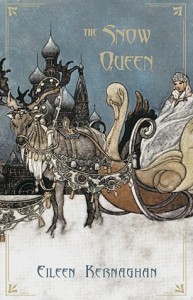 Summary: When Gerda’s childhood friend Kai starts to pull away, burying himself in what he deems to be more sensible areas of study and making fun of her artistic nature, Gerda is understandably confused and distraught. But when Kai’s so-called relative comes to town and seems to cast a spell on Kai before taking him away, Gerda knows something is seriously wrong. She sets out on a journey to save him from the Enchantress and himself, running into obstacles that slow her down, but also end up introducing her to Ritva, a shaman in training who is well-versed in dealing with mystical aspects of life Gerda has trouble with. Together they work on rescuing Kai, outwitting the Snow Queen and making it out of her lair alive.
Summary: When Gerda’s childhood friend Kai starts to pull away, burying himself in what he deems to be more sensible areas of study and making fun of her artistic nature, Gerda is understandably confused and distraught. But when Kai’s so-called relative comes to town and seems to cast a spell on Kai before taking him away, Gerda knows something is seriously wrong. She sets out on a journey to save him from the Enchantress and himself, running into obstacles that slow her down, but also end up introducing her to Ritva, a shaman in training who is well-versed in dealing with mystical aspects of life Gerda has trouble with. Together they work on rescuing Kai, outwitting the Snow Queen and making it out of her lair alive.
Number of Pages: 158
Age Range: 13-14
Review: In an interesting take on Hans Christian Andersen’s The Snow Queen, Eileen Kernaghan uses her version to focus on the different kinds of strength and power, belief and disbelief in the magic and mystical and the importance of self-determination. Her story focuses on Kai’s disappearance, but also on his rescue thanks to the ingenuity of Gerda and Ritva.
Gerda is motivated by her love for Kai. It is so overwhelming that she ventures out on her own without a solid plan to rescue her love. Fortunately, when she runs into trouble, the kindness of strangers keeps her going, until Ritva’s people hijack her carriage. Derailed from her journey Gerda is forced to spend months with Ritva and her family, and over time the two do become friends. Ritva is looking for a way out, a new start, and accompanying Gerda becomes a way to protect her but also to escape and make her own way.
But Gerda and Ritva are quite different. Gerda believes in one God and Ritva believes in many. Ritva knows how to let her soul wander outside of her body and bring it back again, and Gerda clings to the predictability of science. Despite their differences though, the two work well together, supporting each other and bringing diverse strengths to the table. Both have their own kind of power and come into their own on their journey.
It’s inspiring because I really enjoyed their growth. I liked the adventure of the story, and the mystical aspects that come with a fairy tale story. The ending made me sad though. Each girl picks her future, highlighting just how different they are.
Is Kai worthy of all the effort put into his rescue? I don’t know. He is definitely not the most likeable character. I do admire Gerda’s devotion in a way, because she has a great capacity to love. I just wish she could have picked a more responsive person to love who would truly appreciate her.
I’ve read about Hans Christian Anderson’s version of The Snow Queen, but now I’d like to read the actual story. It sounds like Kai is a more redeemable character in Anderson’s tale and I would enjoy comparing the two stories in greater detail.
Memorable Quotes:
“She was excited, and astonished, and appalled, at what she had done. But now, standing in the cold grey daylight on the wharf at Helsingborg, in the shadow of the Keep, sudden panic seized her. She was in a strange town, in a country whose language and customs she hardly understood. She had come too far, there was no possibility of turning back; and now she must find her own way, uninvited, unexpected, on unknown roads to a stranger’s house. Her excitement faded, leaving behind a sick anxiety.” – Gerda from The Snow Queen by Eileen Kernaghan, page 37
“Gerda, who had been listening in silence, thought of what Kat – cool, rational, level-headed Kat – would think of all this. ‘I don’t believe in wizards, and sorceresses,’ she told the old woman. ‘They are tales to frighten children.’
‘Ah, well, little one,’ sighed the old woman. ‘Is it better, or worse, I wonder, to die at the hands of an enemy you don’t believe in?'” – Conversation between Gerda and the old woman about what is real and what is not from The Snow Queen by Eileen Kernaghan, page 91
“‘…if I am to rescue Gerda’s friend from the Enchantress, I will need all the weapons I can find.’
‘But this is not your battle,’ the woman said. ‘It is Gerda’s.’
Ritva looked at her with startled disbelief. ‘What, that little one? My little rabbit? How will she fight the Terrible Enchantress? That is a task for heroes, for women of power.’
‘Like you? But Ritva, there is more than one kind of power. Never underestimate the power of innocence, of a good and trusting nature.'” – Conversation between Ritva and the woman about different kinds of power from The Snow Queen by Eileen Kernaghan, page 94
“On the other side of the mountain, beyond a narrow channel of dark water, lay a world of utter emptiness and silence, a world of profound night. The moon hung like a great pewter dish in a cobalt sky. Trackless snowfields, stained with violet shadows, stretched away to the dark line of the horizon, where they vanished into a silvery mist.” – from The Snow Queen by Eileen Kernaghan, page 116
“‘Our reindeer,’ Gerda called up to them as Ritva steered their boat towards the ship. ‘We have to rescue our reindeer.’
A red-bearded man in a parka grinned down at them. ‘We’re scientists here,’ he said. ‘Hold on. We’ll think of something.’
Moments later her returned with a canvas sling and dropped it down to the,. Bracing themselves against Ba’s heaving flanks, Gerda and Ritva cinched the sling securely around his belly. With a long unhappy sigh the old beast resigned himself to this fresh indignity, gazing accusingly back at them as he was winched slowly up the side of the ship.” – from The Snow Queen by Eileen Kernaghan, page 152
The Snow Queen by Eileen Kernaghan is published by Thistledown Press, (2000).
No More Dragons by Rie Charles
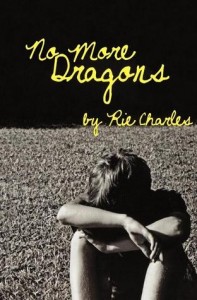 Summary: Thirteen year-old Alex is a kid with a lot on his plate. His father is physically and emotionally abusive, his little brother Tobey has cancer, and at school Alex is being bullied. As everything piles up Alex finds a way to vent by writing letters to Graham, telling him what’s going on and how he’s dealing with it. When Tobey’s cancer gets worse and Alex’s grandmother has an accident of her own, it feels like home life is a pressure cooker. One wrong move can aggravate and invoke his father’s anger, and Alex is beginning to realise he and his mother and siblings can’t live with the dragon anymore.
Summary: Thirteen year-old Alex is a kid with a lot on his plate. His father is physically and emotionally abusive, his little brother Tobey has cancer, and at school Alex is being bullied. As everything piles up Alex finds a way to vent by writing letters to Graham, telling him what’s going on and how he’s dealing with it. When Tobey’s cancer gets worse and Alex’s grandmother has an accident of her own, it feels like home life is a pressure cooker. One wrong move can aggravate and invoke his father’s anger, and Alex is beginning to realise he and his mother and siblings can’t live with the dragon anymore.
Number of Pages: 114
Age Range: 12-14
Review: Other than being a bit confused by who Graham was at first, I quickly realised the story was not about who Alex was writing to, but about Alex’s letters themselves. Through opening up in his writing, Alex is able to explore the difficult aspects of his life. He’s quite independent in that respect, as his self-reflection helps him to cope.
What I like most about this book is Tobey. I like him as a character, but what I also appreciated is how his cancer storyline opens things up for Alex. Dealing with his brother’s terminal illness helps him and his family determine what they will and will not put up with. As Tobey’s cancer gets worse, the family’s capacity to deal with having to walk on eggshells around their father is reduced. It’s all too much, especially when paired with the grandmother’s injury, and comes to be a catalyst for getting the ‘dragon’ out of their lives. Of course there are other factors like Margie being on the receiving end of their father’s violence, but in the end everything seems to work together.
And as a result, there is hope. The dragons in their lives are expelled, one in a tragic manner and the other by being vanquished. Alex grows from essentially wanting to be someone else to making good friends and finding activities he loves and is good at. It’s clear he’s going to be okay, which is reassuring.
I like it as a read for pre-teen to early teen readers.
Memorable Quotes:
“I wiggled my bulky form under the bed until my fingers nudged a mound of slippery, uncrinkled paper. I pulled it out. I flopped the red parcel over. No scotch tape. It rolled and unrolled into a toque with matching mittens and a label: ‘To Alex, From Santa’. In my mother’s handwriting.
My head swooshed. My ears clanged.
A sudden cool breath of air hit me. Someone had opened the front door. I gave the present one quick shove under the bed and ran. In the bathroom I unzipped my jacket, pulled down my snow pants and sat. And sat. My heart and head thudded.
‘Alex. Where are you?’
‘Upstairs. In the bathroom.’
Now I knew things about Santa other kids did’t know. Maybe not things I wanted to know. I also knew I couldn’t tell anyone.
Maybe I had just become big.” – Alex’s realisation about Santa Claus from No More Dragons by Rie Charles, page 55
“Anyways, Tobey asked over and over what bulbs were. I must have told him a dozen times until I realized he just wanted to tell me. So I asked, ‘What’s a bulb, Tobey?’
‘It’s what happens with some plants,’ he said. ‘They got to sleep in the pot under the dirt for a while. Then in spring, they pop up and make new plants.’ He grabbed my face and pulled me to him, his eye almost mushed into my nose. ‘New flowers. They need rain and sunshine. They die. But they grow again. In different pots. They keep going. In different gardens.’
I don’t know why, but I felt weird. Spooked even. Like he was telling me something, I didn’t know what. Tobey is so little, but sometimes he seems so old. Maybe that happens when you get sick.” – Conversation between Alex and Tobey from No More Dragons by Rie Charles, page 73
No More Dragons by Rie Charles is published by Napoleon Publishing, (2010).
Fishtailing by Wendy Phillips
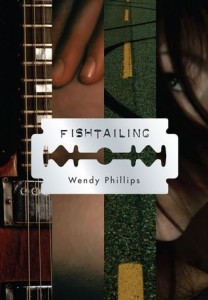 Summary: At a time in their lives when all are vulnerable, Natalie, Tricia, Miguel and Kyle find their friendships and attractions cause them more harm than good. Haunted by abuse in her past, Natalie’s influence poisons the others who are already close to the brink themselves. Expressing themselves through free verse poems often written as highly criticised English assignments, as their connections grow more twisted and individual histories are revealed, tragedy ensues. Even the careful interventions of the school’s guidance counsellor, Ms. Nishi, can’t prevent what becomes an inevitable ending.
Summary: At a time in their lives when all are vulnerable, Natalie, Tricia, Miguel and Kyle find their friendships and attractions cause them more harm than good. Haunted by abuse in her past, Natalie’s influence poisons the others who are already close to the brink themselves. Expressing themselves through free verse poems often written as highly criticised English assignments, as their connections grow more twisted and individual histories are revealed, tragedy ensues. Even the careful interventions of the school’s guidance counsellor, Ms. Nishi, can’t prevent what becomes an inevitable ending.
Number of Pages: 196
Age Range: 15-17
Review: Told through the perspectives of six different people in a free verse format, Fishtailing by Wendy Phillips is the story of three teenagers all caught up in the games of one young woman with severe issues of her own.
I enjoyed the contrast between adult and teen perspectives, and while I didn’t find her to be the most likeable character I did feel empathy for Mrs. Farr in the end. She projects a rough exterior, but reveals the students she teaches do deeply affect her. Ms. Nishi on the other hand, is an obviously compassionate individual. Though she does everything she can in her position, the story still fishtails with manipulation and death.
It’s the title I love the most. Fishtailing describes when a car’s back wheels lose traction, prompting the driver to oversteer in an attempt to correct the situation which can result in a spinout. This is exactly what happens in Phillips’ book with Natalie being the metaphorical low friction surface that starts all the trouble.
Fraught with hardship, it is easy to see why Tricia and Miguel fall under Natalie’s spell. Natalie may not have a good understanding of herself, but she knows how to get what she wants, even if it will ultimately hurt her. Fishtailing is a heart-rending tale, and a quick read.
Memorable Quotes:
“My motorcycle fits together
neat and smooth
bolts and casings
pistons and pushrods
everything in place.
Words just lie
on the page
no schematics,
no fuel lines
no chassis.
A poem is a bucket
of bolts.” – Kyle from Fishtailing by Wendy Phillips, page 32
“The aquarium draws
me, slapping
waves, the squealing
breath of the sea lions, the blue silence
through the underwater viewing window.
The light on her face
leaves shadows
under her eyes
in the hollows of her cheeks
in the blue mask of her face
the eyes, so alive
dark lips smiling
faintly.” – Miguel from Fishtailing by Wendy Phillips, page 68
“Curious how many solstice celebrations involved cleansing rituals, setting the world to rights before beginning afresh. Wouldn’t we all like to have that chance? Those devils don’t always melt away, though, do they?” – Mrs. Farr from Fishtailing by Wendy Phillips, page 98
Fishtailing by Wendy Phillips is published by Coteau Books, (2010).




 Amy Mathers has been passionate about reading from a very young age, and hopes others will share her enthusiasm for funding a teen book award.
Amy Mathers has been passionate about reading from a very young age, and hopes others will share her enthusiasm for funding a teen book award. 





